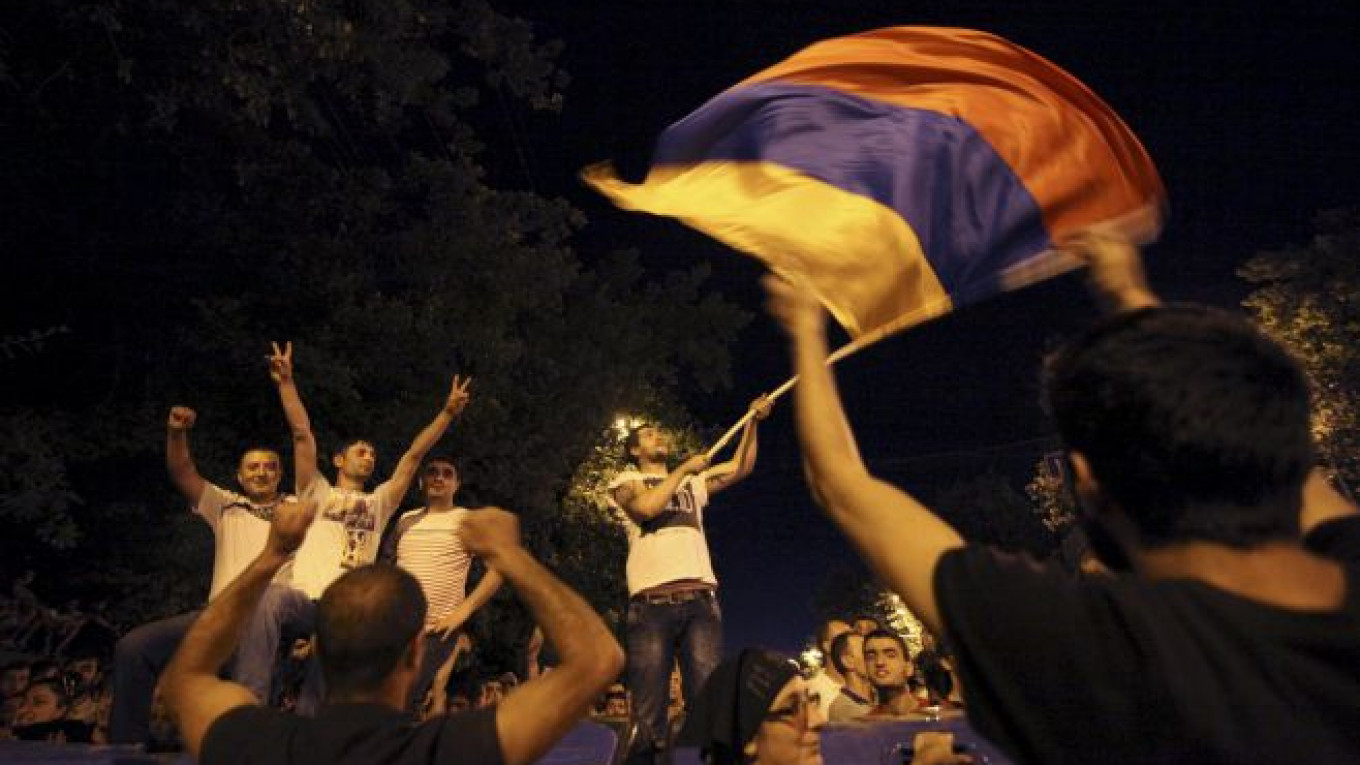Russian lawmakers said Wednesday that rolling protests on the streets of the Armenian capital of Yerevan could be the first stage of a "color revolution" similar to those that have toppled governments in post-Soviet countries including Ukraine, Georgia and Kyrgyzstan.
"It's no use deluding yourself, all 'color revolutions' developed along these lines," said Konstantin Kosachev, head of the International Committee in Russia's upper house of parliament, the Federation Council, the RIA Novosti news agency reported Wednesday.
Thousands of demonstrators angry at a sharp hike in electricity prices took to the streets of Yerevan late last week and have erected barricades and clashed with police. In response, security forces have used water cannons to disperse the crowds and reportedly arrested over 200 people.
Protests, which have been trending under the social media hash tag #ElectricYerevan, continued into Wednesday evening, according to media reports and footage of events broadcast online.
Close Eye
Russia has deep economic, political and military ties with Armenia, and officials in Moscow have said they are closely following developments in the post-Soviet state.
"We are not indifferent to what's going on," said the head of the Federation Council, Valentina Matviyenko, RIA Novosti reported Wednesday. "We hope that it will be resolved peacefully."
The head of the Duma's committee for relations with former Soviet countries, Leonid Slutsky, said Wednesday that the situation was "alarming," according to RIA Novosti.
Putin's spokesman, Dmitry Peskov, told Russian journalists Tuesday that the Kremlin was closely following events as they unfolded in Yerevan.
'Revenge for the Donbass'
Other lawmakers compared the demonstrations to the collapse of a pro-Russia government in Ukraine last year, a process the Kremlin characterizes as a foreign-backed coup.
"This attack on Yerevan was expected … there are probably a lot of fighters from Ukraine among the demonstrators and it is being directed from an external headquarters," pro-Kremlin political scientist Sergei Markov wrote on Facebook on Wednesday. "The main aim of the organizers now is bloodshed."
Other Russian experts placed the Armenian protests within the context of a deterioration in relations between the West and Russia, alleging that foreign states could be provoking instability.
"There is a desire to avenge Russia for the Donbass," said Vladimir Yevseyev, the head of the Caucasus department of the Institute of Post-Soviet States in Moscow, referring to the area of eastern Ukraine in which Russian-backed separatists are fighting Kiev troops.
Entangled Economies
While many Armenian families are dependent on money sent back by relatives working inside Russia itself, Russia has traditionally been a significant investor in Armenia and Russian companies control large swathes of Armenian industry.
In October, Yerevan — which has suffered economically from strained relationships with neighbors Azerbaijan and Turkey — said it was joining the Moscow-driven Eurasian Economic Union championed by Russian President Vladimir Putin as a counterweight to the European Union.
But the close links with Moscow meant that Armenians suffered as the Russia economy slipped toward recession last year amid falling oil prices and Western sanctions.
The value of remittances sent from Armenians in Russia plummeted as the Russian currency collapsed.
Russian Spark
The protests — initially over a 16 percent hike in electricity prices scheduled for implementation in August — have taken on an anti-Russian slant because Armenia's energy monopoly, Electric Networks of Armenia, is owned by Russian state-controlled power group Inter RAO.
The chairman of Inter RAO is Igor Sechin, a Kremlin heavyweight and head of state-owned oil giant Rosneft. Inter RAO was initially seeking a 40 percent electricity price hike.
Moscow gained control of Electric Networks of Armenia over a decade ago as Yerevan did a series of equity-for-debt deals, which saw Russian firms snap up Armenian assets. On its website, Inter RAO says that Electric Networks of Armenia has almost a million customers.
Not Ukraine
Analysts and experts said that comparisons between protests in Armenia and events in Ukraine last year or "color revolutions" in Georgia or Kyrgyzstan were deeply misleading
Aside from the fact that Russia does not have a land border with Armenia, a key difference is the frozen conflict between Armenia and neighboring Azerbaijan over the mountainous region of Nagorno-Karabakh, which sees regular exchanges of fire between troops loyal to Baku and Armenian forces.
The danger of instability reigniting fighting over the disputed territory means neither side facing off on Yerevan's streets has an interest in following a Ukrainian scenario, according to expert Yevseyev.
Others stressed that the unfolding events were uniquely Armenian.
"These socio-economic problems have been accumulating for years," Ismail Agakishiyev, the head of Caucasus studies at Moscow State University, told The Moscow Times.
"It's a completely different situation [to Ukraine], a completely different relationship and a completely different economic and social context," Agakishiyev added.
Contact the author at [email protected]
A Message from The Moscow Times:
Dear readers,
We are facing unprecedented challenges. Russia's Prosecutor General's Office has designated The Moscow Times as an "undesirable" organization, criminalizing our work and putting our staff at risk of prosecution. This follows our earlier unjust labeling as a "foreign agent."
These actions are direct attempts to silence independent journalism in Russia. The authorities claim our work "discredits the decisions of the Russian leadership." We see things differently: we strive to provide accurate, unbiased reporting on Russia.
We, the journalists of The Moscow Times, refuse to be silenced. But to continue our work, we need your help.
Your support, no matter how small, makes a world of difference. If you can, please support us monthly starting from just $2. It's quick to set up, and every contribution makes a significant impact.
By supporting The Moscow Times, you're defending open, independent journalism in the face of repression. Thank you for standing with us.
Remind me later.







